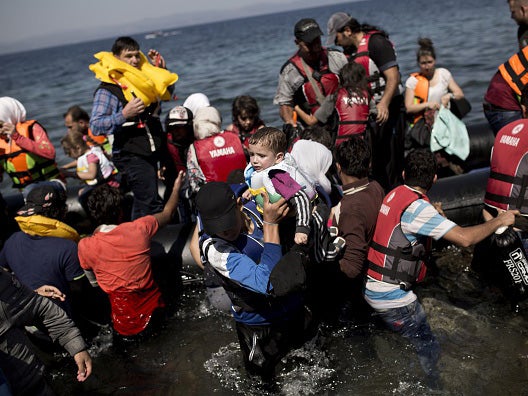Thirty-four refugees including 15 children and babies killed as boat capsizes off Greece
Syrian refugees continue to travel to Europe as countries reclose their borders

Your support helps us to tell the story
From reproductive rights to climate change to Big Tech, The Independent is on the ground when the story is developing. Whether it's investigating the financials of Elon Musk's pro-Trump PAC or producing our latest documentary, 'The A Word', which shines a light on the American women fighting for reproductive rights, we know how important it is to parse out the facts from the messaging.
At such a critical moment in US history, we need reporters on the ground. Your donation allows us to keep sending journalists to speak to both sides of the story.
The Independent is trusted by Americans across the entire political spectrum. And unlike many other quality news outlets, we choose not to lock Americans out of our reporting and analysis with paywalls. We believe quality journalism should be available to everyone, paid for by those who can afford it.
Your support makes all the difference.Fifteen babies and children were among 34 refugees who drowned when their boat sank off a Greek island, in what is thought to be the largest single loss of life in those waters since the crisis began.
Four babies, six boys and five girls died when the wooden vessel carrying them overturned on Sunday morning, about three miles (5 km) east of the small island of Farmakonisi, close to Turkey's coast, the coastguard said.
Tens of thousands of mainly Syrian refugees have braved rough seas this year to make the short but precarious journey from Turkey to Greece's eastern islands, mainly in flimsy and overcrowded inflatable dinghies.
Thousands have died, many of them taking the much longer crossing from Libya, in Europe's worst refugee crisis in decades.
Details of the nationalities and ages of the victims of Sunday's sinking off Farmakonisi were not immediately available.
The coastguard said 68 people were rescued from the water and another 30 survivors from the same boat were found on Farmakonisi.
On Lesbos, an island which has borne the brunt of Greece's migrant intake, a Reuters photographer saw 10 dinghies arriving within 90 minutes on Sunday.
One inflatable carrying about 70 refugees, including many children, burst about 100 metres (90 yards) from the shore. Locals pulled infants and toddlers - including a two-month old baby cradled by his father - ashore on rubber rings.
Greece has regularly called for more help from authorities in dealing with the influx, and caretaker Prime Minister Vasiliki Thanou urged the bloc on Sunday to agree a more comprehensive policy.
Other countries were wrong to criticise Greece's response to the flow of migrants, Ms Thanou said during a trip to Lesbos.
"We would urge them to consider the responsibility of guarding a 16,000 km long coastline of European borders ... and whether a future Europe of principles can be constructed by building walls," she said.
The vast majority of refugees reaching Greece quickly head north to other countries, with Germany the most favoured destination.
EU states have so far failed to reach agreement over proposals by Commission president Jean-Claude Juncker to accept a mandatory quota system for accepting refugees.
Reporting by Reuters
Join our commenting forum
Join thought-provoking conversations, follow other Independent readers and see their replies
Comments